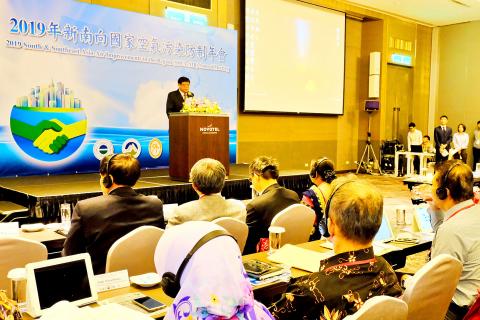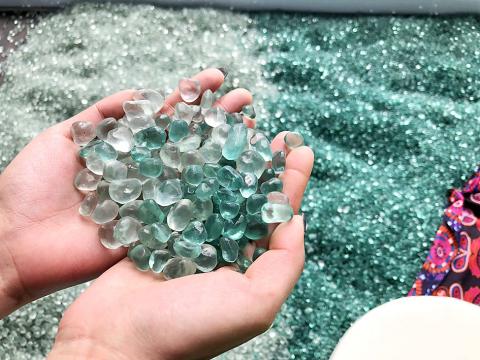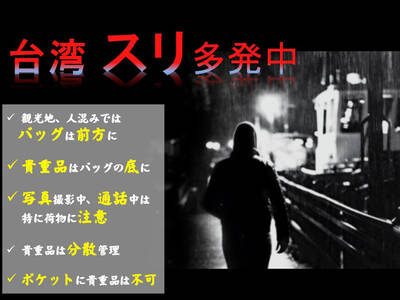Washington has lauded Taiwan’s achievements in environmental protection as a source of inspiration for nations in the Asia-Pacific region.
In just 25 years, Taiwan has built one of the world’s most efficient recycling systems from scratch, with a recycling rate of 60 percent last year, one of the highest in the world, US Environmental Protection Agency Principal Deputy Assistant Administrator Jane Nishida said in October last year.
Taiwan is also well on the way to its goal of completely banning single-use plastic cups, straws, utensils and bags by 2030, she said.

Photo: CNA
“Perhaps, with plastic production showing no sign of diminishing and economic growth inextricably linked to waste generation, rising economies might look at Taiwan before issues with their own garbage get out of control,” a Smithsonian magazine article published in January said.
This is exactly the role the Environmental Protection Administration (EPA) has been promoting through the government’s New Southbound Policy.
As Taiwan’s economy grew in the 1970s and 1980s, it had to deal with many of the serious environmental woes that many of its partner nations are wrestling with today.

Photo: CNA
Taiwan’s decades of knowledge of environmental policy, regulations, technology, services, maintenance and innovation could all serve as assets to benefit its partner nations.
“It is environmental diplomacy,” EPA Deputy Director Tsai Hung-teh (蔡鴻德) said. “Taiwan is well-equipped to play the role of a regional technical center, research center and training center. Many of our visitors are potential high-ranking government officials and these exchanges allow them to develop closer relations with Taiwan. We help with their environmental issues, while we gain friends and create more opportunities for our green industries.”
Rapid economic development, population growth and social inequality in South and Southeast Asian nations have led to environmental problems that threaten the future of the regions, but the good news is that environmental awareness is growing.
As the world’s second-largest polluter of the oceans, Indonesia in March 2017 pledged US$1 billion to reduce 70 percent of its waste by 2025. Bali in June banned single-use plastics and two weeks later the Indonesian government imposed a nationwide tax on plastic bags.
India also plans to phase out single-use plastic items by 2022.
Regional efforts are gaining steam — ASEAN in July launched a High-Level Dialogue on the Environment and Climate Change with the EU.
One avenue through which Taiwan has been sharing its expertise with other Asian nations is the International Environmental Partnership (IEP), a collaboration between the US Environmental Protection Agency and the EPA.
An increasing number of IEP events are being held in New Southbound Policy partner nations, such as the International E-Waste Management Network, which held workshops in Jakarta in October 2017 and Manila in September last year.
This year’s Asia-Pacific Mercury Monitoring Network Partners Meeting took place in Jakarta, while Bureau of Environmental Inspection officials shared their experiences with Vietnamese natural resources officials at a five-day workshop in May.
The IEP in July organized an Air Quality Management Policy Development Workshop in Taiwan, with participants from several partner nations.
At the end of the workshop, the EPA handed 100 Taiwan-made air pollution detection kits to the Vietnam Environment Administration.
Taiwan last year also provided mercury pollution testing equipment and know-how to Sri Lanka.
Outside of the IEP the EPA partnered with the Asian Productivity Organization to send Taiwanese e-waste and recycling experts to Thailand in October last year to observe its methods and provide advice on its needs.
EPA programs also include student exchanges, such as National Dong Hwa University’s Vietnam-Taiwan Research Institute last month sending 12 environmental education ambassadors to Vietnam to interact and exchange ideas with their counterparts.
Through these diverse initiatives, Tsai said that the EPA learns about the pressing needs of each partner nation and what expertise it can offer.
Implementing regional regulations has made it easier for Taiwanese environmental engineering firms and green businesses to target markets in New Southbound Policy nations, Tsai said.
General policy dialogues have included the 2017 Southeast Asian Environmental Forum in Taipei, where high-level officials and experts from nine nations discussed their issues with about 200 Taiwanese environmental professionals.
The discussions focused on how Taiwan could export its expertise to help with regional environmental policy, as well as the environmental challenges Taiwanese enterprises face in their operations in the Asia-Pacific region and how they can play a larger role in solving those challenges.
Taiwan in July last year hosted its first Environmental Protection and Management Forum with Vietnam.
Many partner nations are in need of waste management solutions, Tsai said.
Jakarta in December last year launched its first incinerator project to convert trash into electricity.
Taiwan has abundant experience in that field, having built 24 incinerators between 1987 and 2003, but incinerators alone are not enough to meet the EPA’s vision — the energy produced should be used to generate more value such as electricity or heat, just like Jakarta’s project, Tsai said.
However, not all trash can be burned, Tsai said.
Taiwan is also experienced in recycling and it should impart its know-how in a way that creates industry value, Tsai said, adding that this would produce an ecosystem of connected services that Taiwan could export as a whole.
“We’re not just exporting one thing at a time,” Tsai said. “It is an integrated supply chain.”
Nanoplus Tech, whose diverse services include green technology, in May last year signed a memorandum of understanding with Vietnam-based SPT Telecoms to establish a joint venture that would establish a “circular economy research park,” including landfills, incinerators and recycling plants that turn trash into commercial or industrial products.
The project creates a supply chain of opportunities for other enterprises and organizations, maximizing the value of the venture.
Taiwanese firm Enrestec has developed a unique minimal-pollution pyrolysis method that completely recycles tires into useful materials such as black carbon, fuel oil and steel wire.
It has exported its entire system to Sheico Group in Thailand, which is to produce EU-certified non-toxic black carbon for the world’s largest wetsuit manufacturer.
These innovative ventures mark the latest trend for Taiwan’s lucrative environmental protection industry.
As the nation starts to focus on a circular economy and sustainable development, the green industry is also moving in that direction with widely expanded applications and ever-improving technology.
As environmental awareness grows in Southeast Asia, Spring Pool Glass — which recycles glass into environmentally friendly building materials, household products and art pieces — has participated at numerous Taiwan Expos in New Southbound Policy partner nations.
Each expo features a green pavilion, with platforms that promote Taiwanese services and products that specifically cater to the environmental needs of the host nation.
An expo was held in India for the first time in May last year, with a green pavilion that highlighted “providing India with green solutions to build smart cities” and “helping India solve environmental problems that arise from population growth and economic development.”
With this comprehensive environmental push via official and commercial avenues in partner nations, and the global trend toward green solutions and Industry 4.0 — which prioritizes environmentally friendly manufacturing — coupled with partner nations’ desire to clean up the environment, the opportunities will only increase for Taiwan.
“All of these elements will eventually fall into place, but the most important thing is to do it with the genuine intention to improve the environment of our partner nations,” Tsai said.

GENSLER SURVEY: ‘Economic infrastructure is not enough. A city needs to inspire pride, offer moments of joy and foster a sense of belonging,’ the company said Taipei was named the city with the “highest staying power” in the world by US-based design and architecture firm Gensler. The Taiwanese capital earned the top spot among 65 cities across six continents with 64 percent of Taipei respondents in a survey of 33,000 people saying they wanted to stay in the city. Rounding out the top five were Vietnam’s Ho Chi Minh City (61 percent), Singapore (59 percent), Sydney (58 percent) and Berlin (51 percent). Sixth to 10th place went to Monterrey, Mexico; Munich, Germany; Sao Paulo, Brazil; Vancouver; and Seoul. Cities in the US were ranked separately, with Minneapolis first at

The Japan-Taiwan Exchange Association has cautioned Japanese travelers to be vigilant against pickpockets at several popular tourist spots in Taiwan, including Taipei’s night markets, the Yongkang Street area, Zhongshan MRT Station, and Jiufen (九份) in New Taipei City. The advisory, titled “Recent Development of Concerns,” was posted on the association’s Web site under its safety and emergency report section. It urges travelers to keep backpacks fully zipped and carried in front, with valuables placed at the bottom of the bag. Visitors are advised to be especially mindful of their belongings when taking photos or speaking on the phone, avoid storing wallets and

Scoot announced yesterday that starting in October, it would increase flights between Taipei and Japan’s Narita airport and Hokkaido, and between Singapore and Taipei. The low-cost airline, a subsidiary of Singapore Airlines, also said it would launch flights to Chiang Rai in Thailand, Okinawa and Tokyo’s Haneda airport between December and March next year. Flights between Singapore and Chiang Rai would begin on Jan. 1, with five flights per week operated by an Embraer E190-E2 aircraft, Scoot said. Flights between Singapore and Okinawa would begin on Dec. 15, with three flights per week operated by Airbus A320 aircraft, the airline said. Services between Singapore

ENDORSING TAIWAN: Honduran presidential candidate Nasry Afura said that Honduras was ‘100 times better off’ when it was allied with Taipei The Ministry of Foreign Affairs yesterday said it would explore the possibility of restoring diplomatic relations with Honduras based on the principle of maintaining national interests and dignity. The ministry made the remarks in response to reporters’ questions regarding an article titled: “Will Taiwan Regain a Diplomatic Ally?” published in The Diplomat on Saturday. The article said Honduras’ presidential election in November could offer Taiwan the chance to regain an ally, as multiple candidates have promoted re-establishing diplomatic relations with Taiwan. Honduras severed diplomatic ties with Taiwan in March 2023 in favor of Beijing, but since switching its diplomatic recognition,